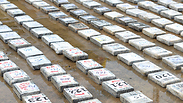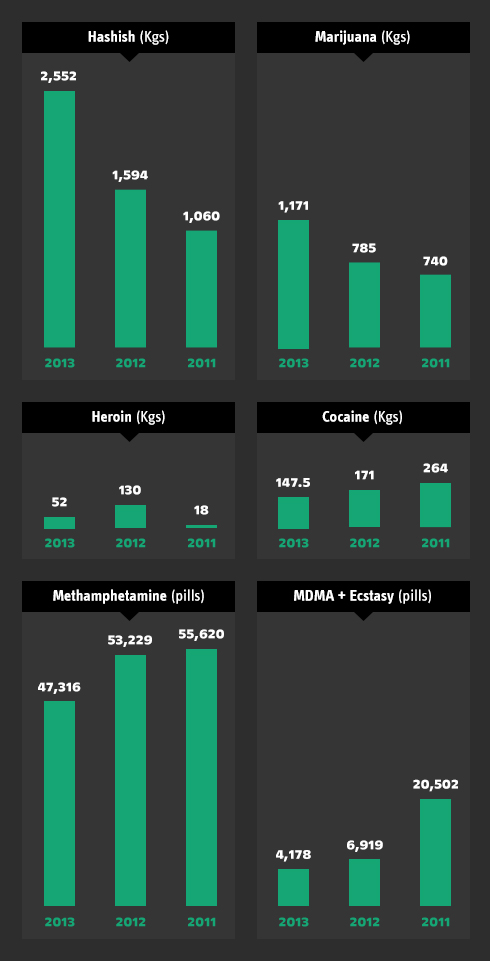
Dope on the table: Over 264 kg captured in 2013
Photo: AFP
Israel's well developed pot smoking community has long lamented the "drought" in marijuana and hash across the country. Now, new police data explain the lack in soft drugs, as well as a number of concerning trends regarding harder drugs.
In response to a request by the Movement for Freedom of Information, the police released Wednesday data acquired by Ynet on the amount of drugs captured by the police between 2011-2013, with a drastic 150 percent rise being registered in the amount of hashish and marijuana confiscated by police.
According to the data, during that period the police captured 2,552 kg of hashish, as opposed to 1,060 in the previous period. A more moderate but still pronounced increase was also felt in the amount of marijuana captured by law enforcement – from 785 kg to 1,171 kg.
The data regarding the years 2011, 2012 and 2013 revealed a concerning drop in the amount of MDMA and Ecstasy pills captured by the police: From 20,000 pills in 2012, to 7,000 in 2012 and all the way down to 4,178 in 2013.
Cocaine seizures were also on the decline, with 264 kg being captured in 2011, down to 171 in 2012 and finally reaching 147.5 last year.
Heroin was less consistent – with 18 kg being taken in in 2011, a number which jumped to 130 kg in 2012, dropping down to 52 kg in 2013.
According to the police's response to the request, the confiscated contraband is kept in police stations and only then, after the decision to destroy them is taken, are they transferred to the police's central forensics unit for destruction.
The cost of destroying the drugs is valued at NIS 91,000 annually and is conducted under the oversight of one privately owned company.
Director-General of the Movement for Freedom of Information, Alona Wienograd, told Ynet that "our request was filed at the initiative of student volunteers from our Freedom of Information Law Clinic.
"Through the clinic we hope to expose future lawyers and jurists to the importance of the Freedom of Information Bill in regards to the relations between the citizen and authorities. The student's initiative and the police cooperation work to reinforce the public's right to information, regardless of its content."
State Comptroller Joseph Shapira pointed to a number of issues at Ben-Gurion International Airport which he claimed, in a report from last October, allowed drugs to enter Israel illegally. He called on the Airport Authority to form a special task force which would focus solely on preventing drug smuggling, a responsibility which now falls to the airport's tax and custom officials.
Two months ago the police captured the largest shipment of the semi-legal Mr. Nice Guy – a synthetic drug which emulates the effects of marijuana and is sold in kiosks in Israel as incense. At the time, the police confiscated a whooping 3.5 tons of the drug, valued at roughly NIS 70 million.
















